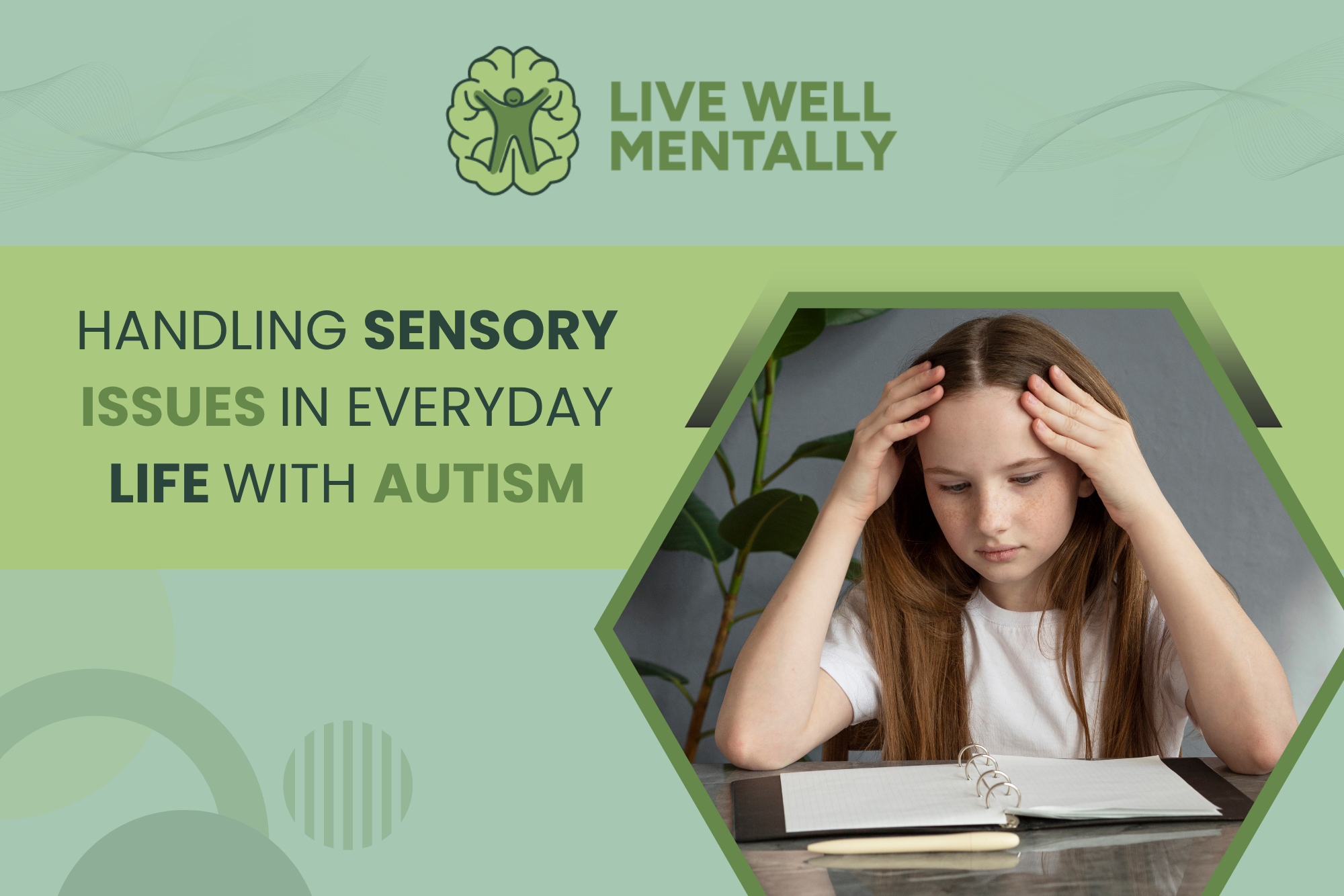Imagine walking into a room where every sound feels louder, every light seems brighter, and even a soft touch feels overwhelming. For many people with Autism Spectrum Disorder (ASD), this is everyday life.
At Live Well Mentally, we help people with sensory issues find comfort and confidence through personalized therapy and guidance to live well.
Let’s explore what sensory issues are, why they happen, and how to handle sensory issues in everyday life with autism.
What Are Sensory Issues?
Sensory issues refer to how a person experiences sights, sounds, touch, taste or smells as overwhelming or lacking.
For some, a dog barking can be painful. Others have sensitive shirts, which might not feel comfortable around them.
Some individuals love the smells, and others do not like them at all.
Autism is associated with sensory problems. These are not an option; they are a fact of the brain in processing information.
Common Types of Sensory Sensitivities in Autism
Hearing: Noise may be intimidating. A person can get startled because of sudden sounds.
Sight: Upset in seeing bright lights, busy places, or moving things.
Touch: Tags, seams, or tight clothes can feel wrong. Light touch might be hard to notice.
Taste and Smell: Food can either be too salty or too stale.
Movement: Swings or sudden moves can feel too fast or too slow.
At Live Well Mentally, our caring therapists help children, teens, and adults realize these emotions. We collaborate to seek means of feeling safe, balanced, and in control.
How Sensory Issues Affect Daily Life
Daily life is a struggle with high sensory sensitivities.
A trip to the store might feel too noisy, a crowded classroom too bright or confusing, or even brushing hair and wearing shoes might cause distress.
Anxiety and frustration often follow these moments. But with gentle guidance, improvement is possible. Families and caregivers can learn how small changes can bring big relief.
Live Well Mentally focuses on helping families discover these small but powerful changes. Our online sessions teach coping tools that can be practiced at home, making life smoother and more comfortable.
Helpful Tips for Handling Sensory Issues
Make a Calm Space
Make a quiet spot at home. Put soft pillows, a favorite blanket, and low light. This space helps when feelings get big.
Choose Comfortable Clothes
Choose clothes that feel good. Try soft fabrics and flat seams. Some people like loose clothes. Others like snug shirts. Let the person pick.
Respect Food Preferences
Make small portions of new foods adjacent to familiar foods. Allow the individual to try. A warm meal may seem distinct from cold meals. Small changes help.
Prepare Before Going Out
Before going to a loud or noisy establishment, discuss the coming event. Bring something that makes one feel better, such as headphones or a favorite toy.
Plan Gentle Transitions
Changing from one activity to another can be hard. Give brief warnings, such as “We are going in five minutes,” to prepare them.
Try Sensory Tools
Fidget toys, chewy necklaces, or weighted blankets can help calm and focus the mind.
Practice Deep Breathing and Movement
Mild activities can help soothe the body and mind. Consider trying:
- Stretching
- Yoga
- Deep breathing
For some, these activities support the release of anxiety and enhance their sensory clarity.
These strategies are also applied at Live Well Mentally, where we help families create consistent and relaxed routines.
Supporting Sensory Needs in School and Work
Sensory issues impact daily life, including focus, confidence, and work or school.
In school:
- Offer quiet breaks in calm areas.
- Allow fidget tools or ear defenders.
- Give instructions that are clear and gentle.
At work:
- Provide noise-canceling headphones or quiet spaces.
- Allow flexible lighting and sensory breaks.
- Maintain calm and clear communication.
The team at Live Well Mentally helps teachers and employers understand these needs better. Our sessions can guide you in creating inclusive environments supporting every learner or worker.
How Families Can Support
The most appropriate support system is the family. It makes a difference with love, patience, and care.
- Watch what makes your child upset or calm.
- Be understanding and tender with them when they are stressed.
- Celebrate small wins, like trying a new food or handling a loud place for a few minutes.
- Take breaks together to rest and relax.
At Live Well Mentally, we help families learn these skills step by step. We guide parents to understand sensory needs and build peaceful routines.
When to Ask for Professional Help
In rare cases, sensory difficulties can lead to meltdowns, sleep disturbances, or stress, which influence everyday life. In case this occurs frequently, one should seek assistance.
Live Well Mentally assists people with autism and their families in managing sensory difficulties with the help of custom-made therapy and medication management. We offer telehealth care in Connecticut so you can get assistance from the coziness of your residence.
Our professionals help with sensory overload, anxiety, and emotional turmoil. We also guide parents on creating peaceful routines.
Closing Words
Many individuals with autism have sensory problems in their lives. They are hard, but there are soft ways of being helpful.
Simple equipment, positive words, regular routines, and much practice are useful for making one feel safer.
At Live Well Mentally, we support people with autism in Connecticut through telehealth services, including therapy and behavior planning. Contact us for support and a simpler life.
FAQs
Can sensory issues get better over time?
Yes. Numerous individuals learn how to deal with them. Under the care and counseling of Live Well Mentally, children and adults tend to live more easily daily.
Can sensory issues cause anxiety?
Yes. The loud sounds, bright light, or some textures might lead to stress or worry. Learning coping skills through Live Well Mentally’s therapy can help decrease anxiety and develop resilience.
Are sensory issues the same for everyone with autism?
No. Autistic individuals are all different. Live Well Mentally develops individual care plans to address the personal needs and strengths of each individual.


